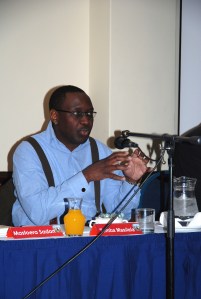Report from the Locating the Power of In-between conference
http://www.hsrc.ac.za/Research_Publication-21525.phtml
The report from the Locating the Power of In-between conference held in Pretoria, South Africa, 2008, takes an in depth look at the role of intermediaries in supporting and enabling evidence based policy. It builds on the rich discussion at the event and aims to raise awareness of the contributions that intermediaries can make in development processes.
The report identifies key issues from the conference and presents them for further analysis, discussion and action. The findings from the conference show that:
- the issue of how evidence can inform policy and practice is an important shared concern and that the contribution of intermediary actors within that picture is significant and worthy of further attention
- there are a wide range of areas in which intermediary actors have the potential to address barriers to evidence-based policy, particularly by facilitating information flows between development actors and helping to set agendas in research, policy and practice arenas
- intermediary roles are not currently being played as extensively as they might, and the intermediary sector needs to step up to fulfil its potential in the sector
Since the conference, a lot of work has been done analysing and responding to the ideas and issues that emerged from the conference. The I-K-Mediary Network, a network of people actively involved in intermediary work, many of whom attended the conference, has continued to develop and grow and continues to champion the role of intermediaries in development. Last year the group undertook case study work to understand its influence in change processes in different contexts, and also recently met in the UK to reflect on the conference findings and discuss areas for future collaboration. The report from this meeting entitled ‘Intermediary understanding, impact and action’ and a summary of the case study work entitled ‘Intermediary Impact’ are both available at www.ids.ac.uk/go/knowledge-services/strategic-learning-initiative/i-k-mediary-group/publications
Please do share your reflections, thoughts and ideas on reading the conference report and related follow up work.



 Posted by powerinbetween
Posted by powerinbetween 
